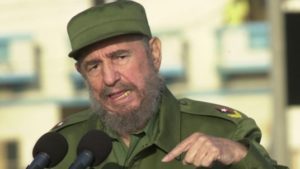A necessary tribute to Fidel Castro

Fidel Castro’s death has sent a sharp pain and emptiness to the hearts of most humanists, pan africanists and lovers of progressive politics.
Although he lived to a ripe age of 90 years after surviving more than six hundred assassination attempts and many forms of vilification, his departure is a big blow to the poor, oppressed and marginalised people in the world.
He grew up lacking no material comfort but he understood and identified himself with the cause of the oppressed having abandoned his the privileges that draped him at birth. Fidel’s influence spread from Cuba right from his triumphant entry into Havana in 1959 to Latin America, Africa and Asia, where majority of the world’s poor live.
He would be fondly remembered in Africa for his military and humanitarian assistance in moments of desperate need. The history of Algeria’s war of liberation would not be complete without the mention of the iconic freedom fighter. His immense contribution in the liberation of South Africa, Mozambique, Angola, Namibia and Congo is well appreciated. His teachers and doctors’ brigade helped and continue to help many African countries including Ghana to fight ignorance, disease and poverty.
Fidel saw the African decolonialisation and development process as a duty and expected no material reward in return. In fact, he described it as “the most beautiful cause of humanity” and an integral part of his internationalism project.
In the case of Angola, he took one of the greatest military risk in history by deploying a missile interceptor which formed an integral part of Cuba’s internal security set up. His soldiers fought side by side Africans against imperialist forces until Apartheid South Africa was forced to negotiate for the decolonisation of Namibia and the subsequent evaporation of the inhuman and brutal racial machinery perpetuated by the white minority rule.
In Mozambique, he sent teachers and doctors to help construct the foundation of the country mangled by departing a Portuguese army and a predatory and vicious enemy in the white South African government.
His secret involvement in Congo culminated in the victory of Kabila after years of misguided and brutal dictatorship of Mobutu.
Fidel was one of the few people who appreciated the cause of the oppressed and tactics of the oppressor. Writing under the headline “a necessary introduction”, in the Bolivian Diary, the classic diary of Che Guevara, his friend and revolutionary martyr, he wrote, “During the first fight for independence, the enemy our ancestors fought was a decadent colonial power. The enemy which today’s revolutionaries have to reckon with is the most powerful bastion of the imperialist camp, the most highly advanced, technically and industrially” but he warned that “there will be good excuses not to fight at all times and in every circumstance, and that will be the surest way never to win freedom”
Fidel was intellectually sound, had a strong character and devoted his entire life to the cause of his people and the oppressed. He marvelled at the way his detractors failed to understand that he was offering help to African countries not for oil, diamond or gold. Fidel’s life cannot be adequately captured in these few moments of grief because his life needs in-depth analyses and appreciation. But from what we have heard and seen, the handsome man who always wore military fatigues, a beard and cigar had left the fore front of the struggle for equality and equity.
Pan Africanists would always remember and cherish his contribution to the emancipation and development of the people of Africa.
By Samuel Osei-Frempong
Source: GNA
